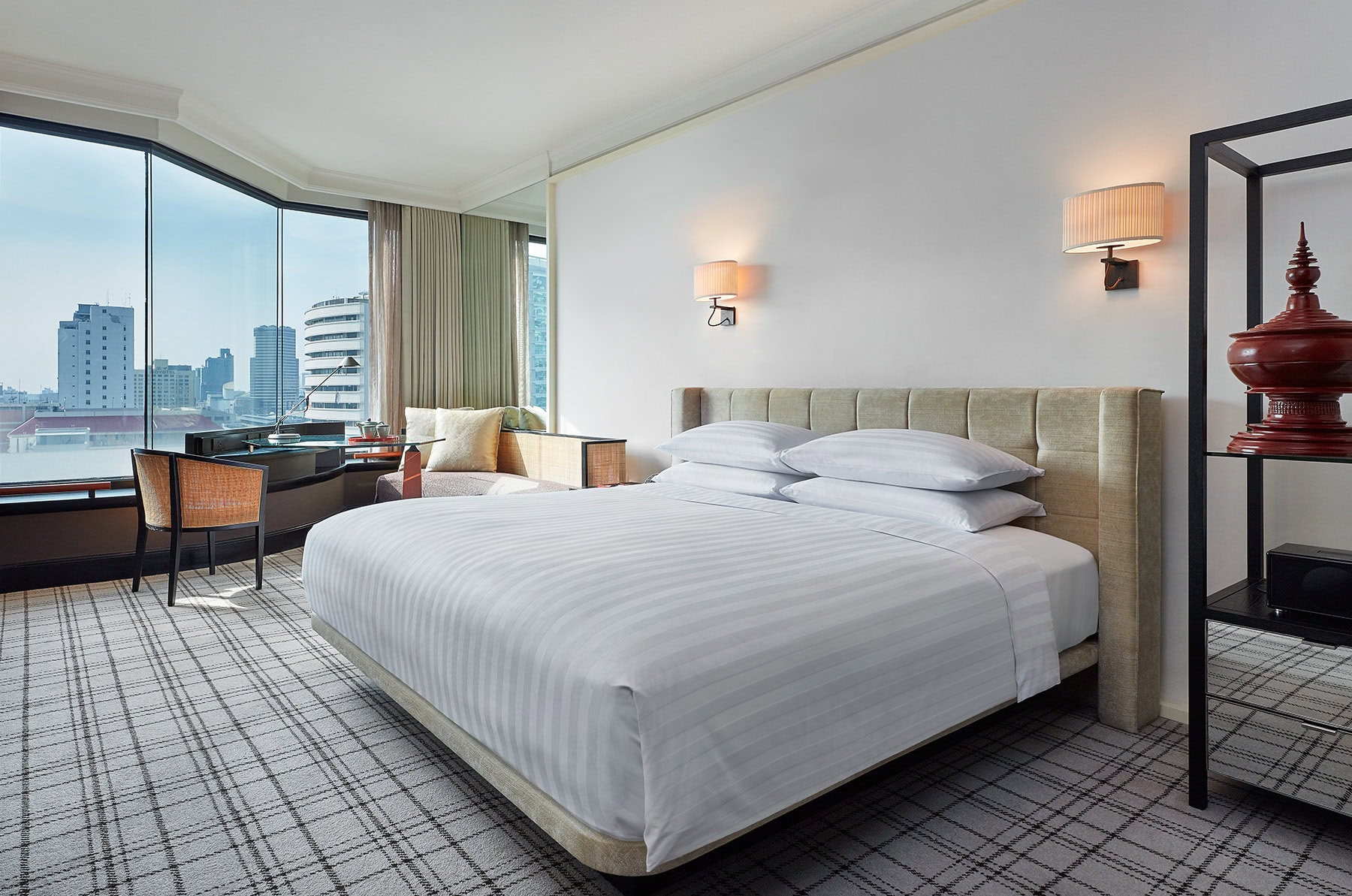
Feng Shui in Hotels: The Key to a Restful Stay
A well-designed hotel room does more than just look good—it creates an atmosphere of relaxation and balance. For centuries, feng shui, the ancient Chinese art of arranging spaces, has been used to harmonize environments with positive energy (chi). Whether or not a guest is familiar with feng shui, a room designed with its principles in mind can promote a better night’s sleep and an overall sense of well-being.
Some hotels fully embrace feng shui, while others incorporate key elements that align with its principles. If you’re looking for a hotel that fosters relaxation and harmony in, here are some essential features to consider:
1. A Solid Headboard for Security and Support
A well-attached headboard provides stability and support for restful sleep. The best options are made of wood or upholstered in natural fabrics. Ideally, the bed should also face south to optimize chi flow.
Neil Jacobs, President of Global Hotel Operations for Starwood Capital, explains, “You wouldn’t build anything in most parts of Asia without having feng shui consultants come in and help you.” (Boston Hospitality Review)
2. Open Space Beneath the Bed for Energy Flow
An open area under the bed allows energy to circulate freely. Many hotels use solid bed bases or under-bed storage, which can block energy flow, making this a rare but valuable feature.
3. The ‘Command Position’—Doors in Sight, But Not Aligned
In feng shui, the best bed position allows a clear view of the entrance without being directly in line with it. This arrangement provides a sense of security. Beds facing the door directly are said to be in the “coffin position,” which may lead to restlessness.
4. Plants
Bringing a sense of vitality and promoting chi (positive energy), plants are a welcome addition to any space. In some cases, specific plants are seen to bring good luck such as the money plant, or the lucky bamboo. Plants like peace lilies and aloe vera can also absorb negative energy (sha chi) caused by things like electronic devices or clutter.
5. Neutral colours
Neutral colours create a relaxing harmonious atmosphere. Essential to feng shui is the balance between Yin and Yang. In this case Yin would be heavy dark colours and Yang bright. Earth tones, wood, terracotta and sand, are also said to ground us.
6. Balanced Nightstands for Stability
Symmetry matters in feng shui. Matching nightstands on either side of the bed promote balance and create a more grounded, harmonious environment.
7. Avoiding Beds Under Windows
Energy flows in and out through windows, so a bed placed underneath one can lead to disrupted sleep. This position can also create a subconscious feeling of vulnerability.
8. No Mirrors Above the Bed
Mirrors are thought to amplify energy, much like windows. Placing one above the bed can create a sense of unease and overstimulation, affecting sleep quality.
9. Open doors
Closed doors can block shi and therefore symbolically block new opportunities. They can also symbolise emotional barriers. Keeping doors open avoids stagnant energy as allows shi to flow freely.
10. Space Around the Bed for Balanced Energy
A bed pushed against a wall can create an imbalance of yin and yang energies. Open space around the bed helps chi flow freely, fostering a more restful environment.
Guest Experiences with Feng Shui Hotels
- A guest at the Melarose Feng Shui Hotel, Berlin: “I had a very nice stay. Drinking tea in my room while enjoying the window view made me feel connected to the city’s energy.” (Hotels.com)
- A traveler at the Feng Shui Resort & Spa, Vietnam: “The room was fabulous. Large, comfortable, and surrounded by lush greenery. It felt like a perfect escape from city life.” (TripAdvisor)
Notable Feng Shui Hotels Around the World
For those looking for hotels designed with feng shui principles, here are a few top choices:
- Avalon Hotel, Gothenburg, Sweden – A feng shui-certified hotel featuring water elements and rounded edges to enhance energy flow.
- Viana Hotel and Spa, New York, USA – Marketed as Long Island’s only “green-built” feng shui hotel, designed for holistic balance.
- Hong Kong Disneyland Hotel – Subtly integrates feng shui principles within its Victorian-style architecture to ensure harmony.
- The Landmark Mandarin Oriental, Hong Kong – A feng shui-inspired hotel in one of the world’s busiest cities.
- COMO Shambhala Estate, Bali – A wellness retreat designed with feng shui and Balinese architectural traditions to promote relaxation.
Who Chooses Feng Shui Hotels?
While feng shui enthusiasts are naturally drawn to these hotels, many travelers benefit from their design without realizing it. Business travelers, wellness seekers, and those looking for a peaceful stay often appreciate the calming effect of spaces that follow feng shui principles. The rise of wellness tourism in destinations like Thailand, Singapore, and Los Angeles has further increased demand for spaces designed with energy flow and relaxation in mind.
Finding a Feng Shui-Friendly Stay
Fully feng shui-certified hotels may be rare, but many accommodations incorporate key elements that enhance energy balance. RightRooms is working to identify and showcase hotels that offer these features (launch in the spring). Whether it’s a solid headboard, clear entry views, or open space around the bed, these details can make a real difference in the quality of your stay.
If you’re searching for a feng shui-friendly hotel in London, Thailand or Mexico, keep an eye out for these features. Small design choices can have a significant impact on energy flow, and ultimately, on how rested you feel after your trip.